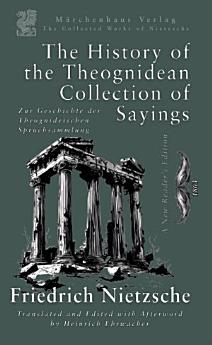The History of the Theognidean Collection of Sayings: A New Reader's Edition
May 2024 · The Collected Works of Friedrich Nietzsche Book 6 · Marchen Press
Ebook
149
Pages
family_home
Eligible
info
reportRatings and reviews aren’t verified Learn More
About this ebook
This work was printed by the Rheinisches Museum while Nietzsche was a student (one of 3 essays the Museum printed by Nietzsche) The original German title is "Zur Geschichte der Theognideischen Spruchsammlung" and was first printed in the "Rheinisches Museum für Philologie Neue Folge", in 1867. This work is Greek-heavy, as it is a pure Philology. Nietzsche wrote this essay at the University of Leipzig, after leaving the Theology department at the University of Bonn. This was a major shift in his focus, moving from Theology to Philology (studying ancient Greek texts), and then afterwards to Philosophy. After these years of intense study and publishing on ancient Greek texts, he becomes a professor at the University of Basel, where he begins lecturing on ancient Greek figures. He writes in his journals: I felt very comfortable here; Above all, I found a number of like-minded comrades with whom I soon formed a philological club. In it I gave five major lectures, the titles of which will be listed here. "The final redaction of the Theognidea", "The sources of Suidas", "The Aristotelian lists of writings", "The simultaneity of Homer and Hesiod", "The cynic Menipp and the Varronic satires". At Ritschl's instigation , the following essays were then printed in the Rheinisches Museum: "On the history of the Theognidean collection of sayings", "The Song of Danae of Simonides", "de Laertii Diogenis fontibus". In 1866 I set out to solve a prize task set by the philosophy faculty. I received the news in Naumburg that I was lucky to have done this. This modern translation from the original manuscript is designed to allow the armchair philosopher to engage deeply with Nietzsche's works. The language is modern and clean, with simplified sentence structures and diction to make Nietzsche's complex language and arguments as accessible as possible. This Reader's Edition also contains extra material that amplifies the manuscript with autobiographical, historical and linguistic context. The edition includes an Afterword by the Translator on the history, impact and intellectual legacy of Nietzsche in context of this work, an index of Philosophical concepts used by Nietzsche with a focus on Existentialism and Phenomenology, a complete chronological list of Nietzsche's entire body of works, and a detailed timeline of Nietzsche's life journey, including the personal relationships which greatly influenced his philosophy.
About the author
Friedrich Nietzsche (1844-1900) was a watershed German philosopher, cultural critic, poet, musician (briefly) and philologist (the study of ancient manuscripts) whose work has had a profound impact on modern intellectual history. Known for his critiques of European morality and religion (particularly Protestantism), Nietzsche's ideas on the "will to power" and the "Übermensch" have influenced a wide range of philosophical, literary, and psychological thought including thinkers such as Martin Heidegger, Albert Camus, Michael Foucault and the entire Postmodern religion.
Rate this ebook
Tell us what you think.
Reading information
Smartphones and tablets
Install the Google Play Books app for Android and iPad/iPhone. It syncs automatically with your account and allows you to read online or offline wherever you are.
Laptops and computers
You can listen to audiobooks purchased on Google Play using your computer's web browser.
eReaders and other devices
To read on e-ink devices like Kobo eReaders, you'll need to download a file and transfer it to your device. Follow the detailed Help Center instructions to transfer the files to supported eReaders.











